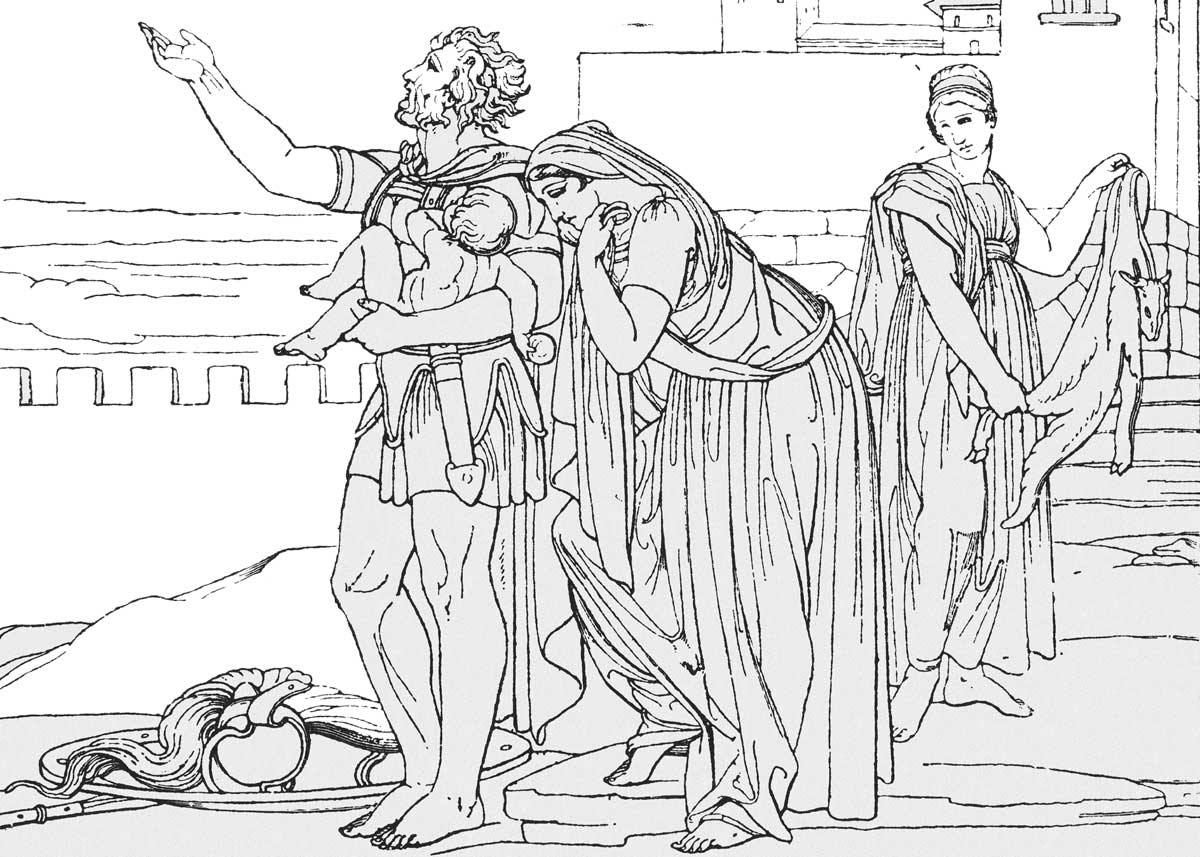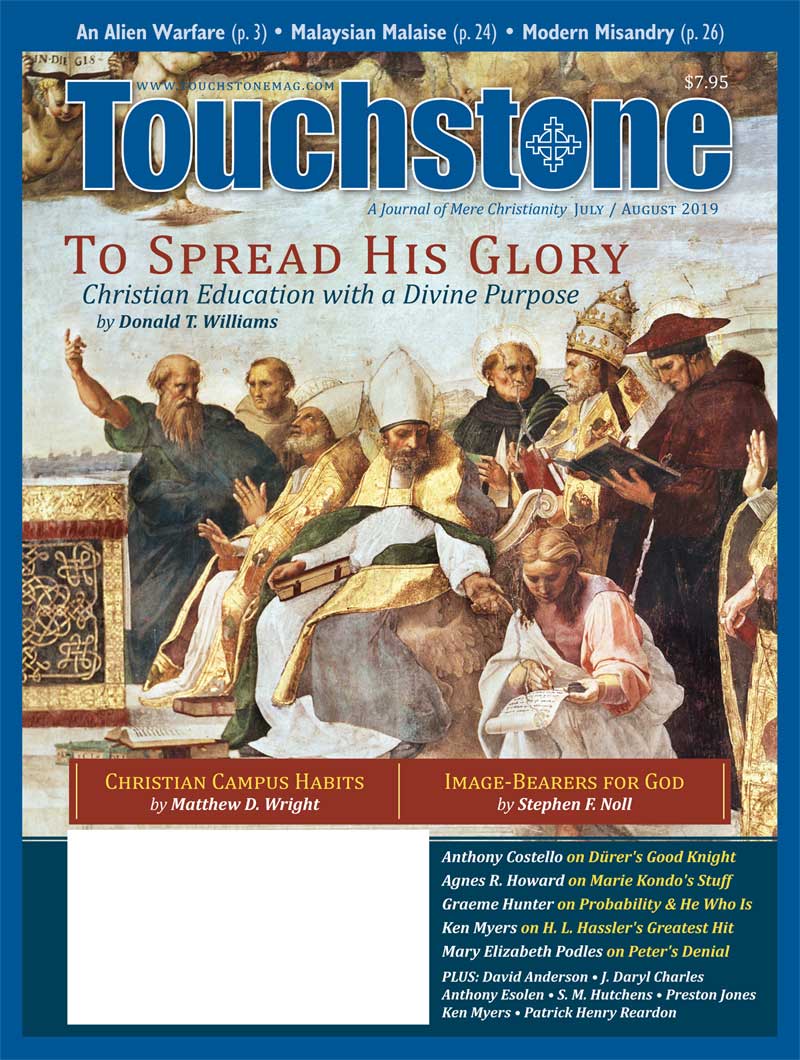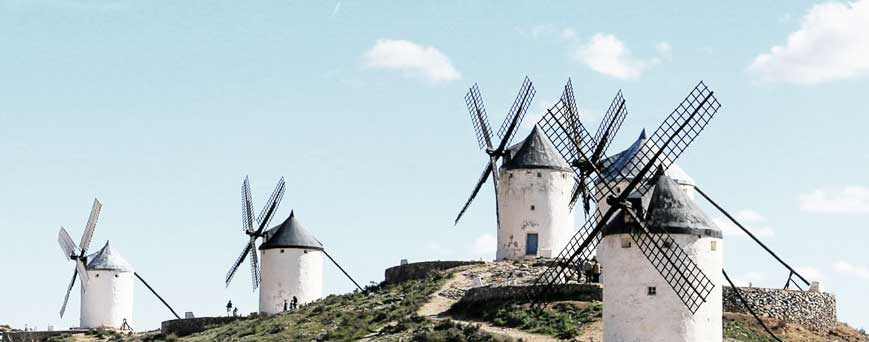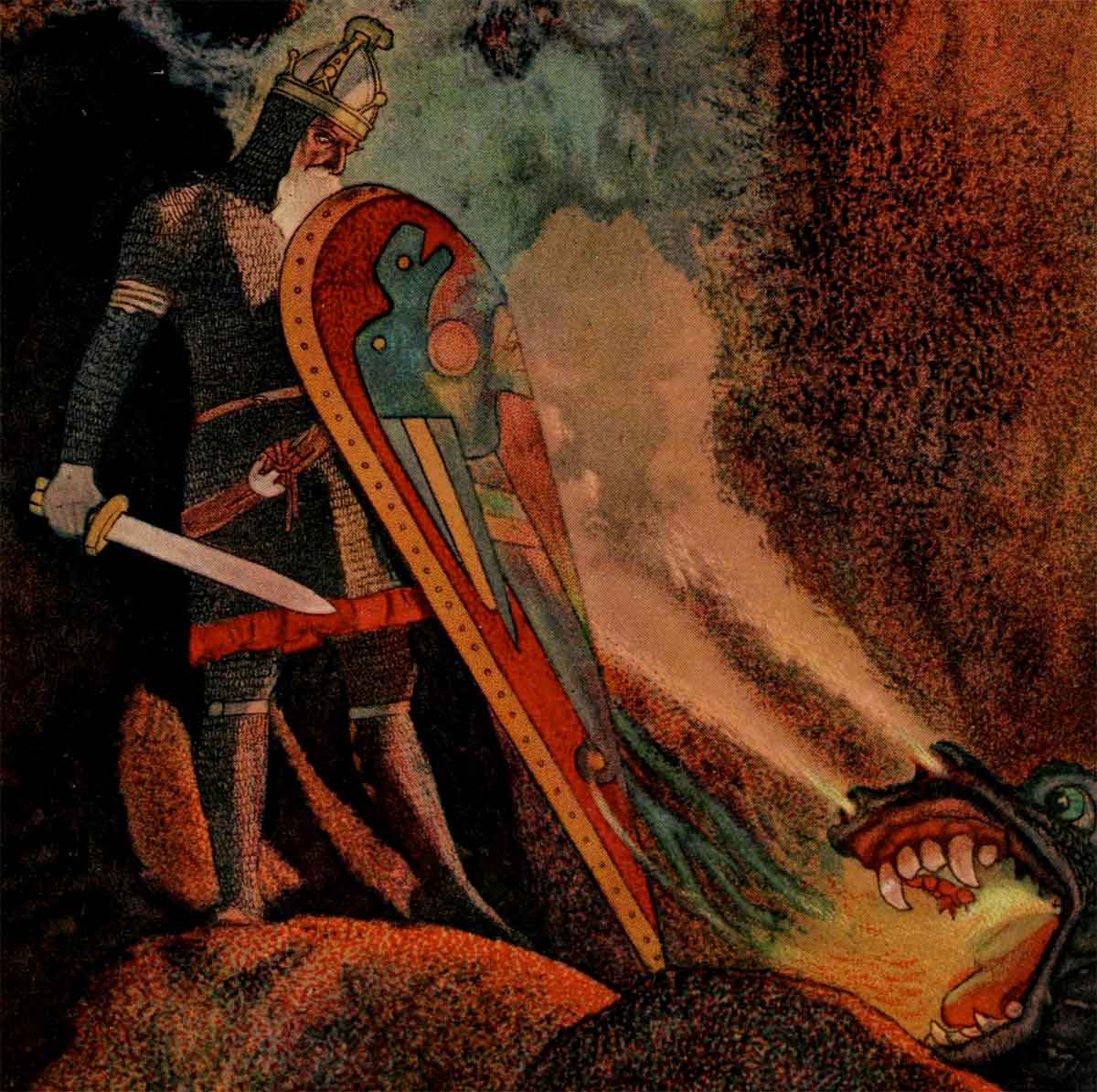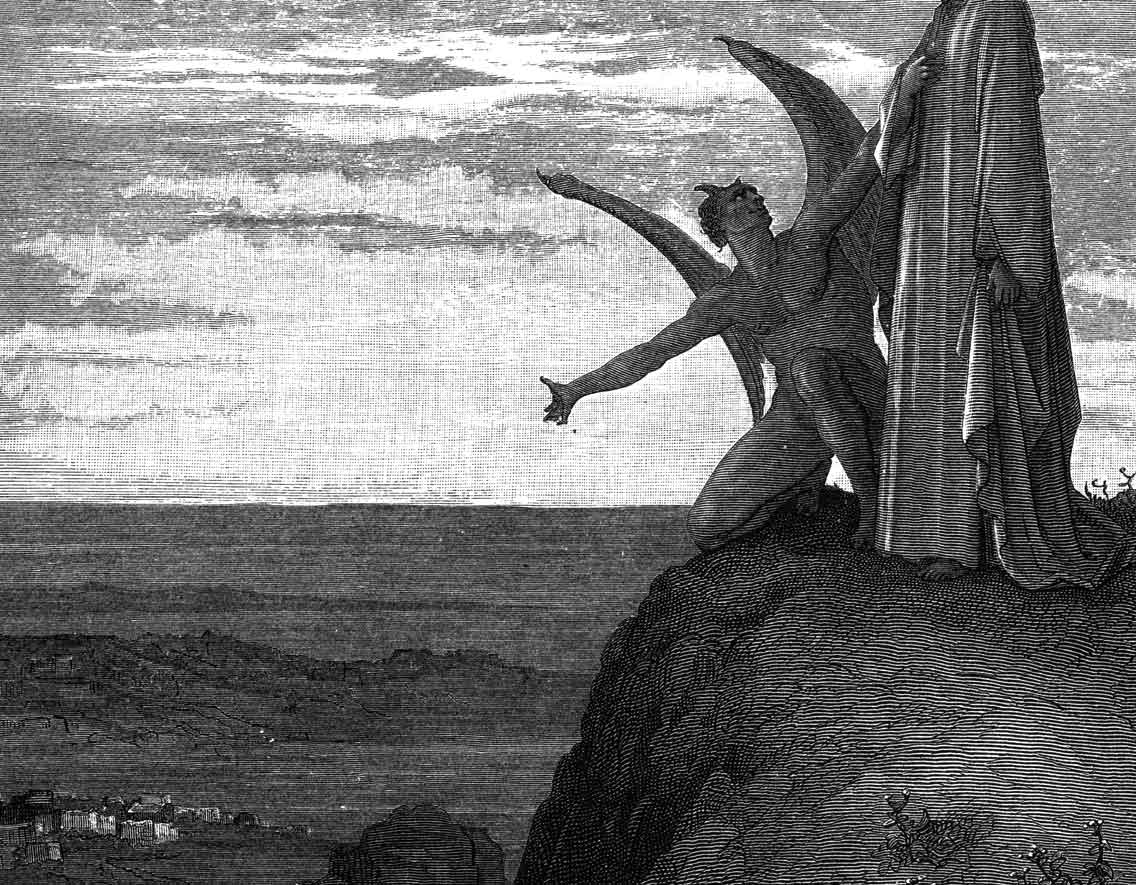Feature
The Habit of Community
Reception, Gratitude, & Witness on a Christian Campus
“I will sing of the steadfast love of the Lord forever! With my mouth will I make known your faithfulness to all generations!” (Psalm 89:1). These words of the Psalmist express the heart of what I want to say here—and, indeed, contain the essence of the title I’ve given these remarks: “The Habit of Community.” Before we unpack the Psalmist’s words, however, I want to back up a bit to get a few ideas on the table.
T. S. Eliot has made me more sensitive lately to noticing the patterns of life. His Four Quartets is primarily concerned with being able to see something he calls “the still point”—those moments in which we get a flash of insight into the intersection between the eternal and the temporal. In these moments we can see how we are called in the midst of our human frailty into fellowship in the life of God. Some of us are called to contemplative vocations devoted to attending to such insights, but for most of us, Eliot observes, the divine breaks through—the meaning of our existence emerges—in the patterns of life: “prayer, observance, discipline, thought and action.”
Of course, we have patterns that structure our life together here in the Torrey Honors Institute. There are those times when there’s a massive migration to turn in the first submission of the Torrey paper at 4:30 on a Friday afternoon—or the semesterly ritual of hauling all your books across campus to Don Rags [final oral exams] and standing around in the hall like you’re at a doctor’s office waiting to have your tonsils removed. In those moments, you realize, “Hey, we really are all working on a common project—pursuing wisdom as a common good.” This convocation is a pattern, too, a time at the beginning of the year when we come together to commit ourselves to pursuing with whole hearts what God has given us to do.
Some patterns are only noticeable to faculty because we don’t really move through the curriculum but get to swim around in it year after year. One pattern I love is reading Homer every year with the incoming freshmen. It strikes me that there’s something uniquely illuminating about beginning our journey together into the great tradition with those words that ring down through the centuries: “Sing, goddess, the anger of Peleus’ son Achilleus / and its devastation, which put pains thousandfold upon the Achaians.” I think, in fact, one of the deep veins of wisdom in the Iliad turns out to be a justification of the whole project we’re engaged in together here. So let’s spend a few minutes thinking together about the Iliad.
Facing Mortality
Achilles first appears to us as a man driven by his passions—first by his desire for honor, and subsequently by his fierce anger when that desire is disregarded by Agamemnon. The problem is not that Achilles defends his honor or is enraged at Agamemnon’s high-handedness. That makes perfect sense in the Homeric economy, where honor and glory cut to the heart of the warrior’s worth. The distinguishing feature of Achilles’ rage is that it is unrelenting. And it’s not just that he’s a really, really stubborn guy. His implacability exceeds all human proportion. It even goes beyond that of the gods. Thus, Achilles’ aged guardian, Phoenix, pleads with him: “Achilles, beat down your great anger. It is not yours to have a pitiless heart. The very immortals can be moved; their virtue and honor and strength are greater than ours are—and yet . . . men turn back even the immortals in supplication” (IX.500).
Achilles’ rage outstrips even the gods because he lusts for their immortality. And we can understand this, right? Solomon tells us that God has put eternity into all our hearts, and Achilles feels the pull of transcendence even more: his mother, Thetis, is a goddess. She’s a minor goddess, yes, and his father is a mortal. Still, Achilles feels his divine pedigree. Even among the Achaian and Trojan heroes, he’s like a god on the battlefield. Moreover, his mother has told him that he can attain everlasting glory if he dies on the plains of Troy. So Achilles yearns for immortality—and thus Agamemnon’s insult is caught up into a narrative that transcends the lives and suffering of mere mortals. Achilles wants to be a god. So when Agamemnon treats him like a hired hand, he’s willing to burn it all down—deaf and blind to the suffering of his own people.
The trouble is that Achilles is not immortal. He is a man doomed to die and to live a life marked by death. It is not until the Odyssey that we see the final humiliation of his longing to be more than he is. Yet, within the narrative of the Iliad, his greater-than-Olympian rage is twice undone by the deep wounds of death. First, the death of his dear friend Patroclus shatters his inhuman aloofness from suffering, and he returns to the battlefield. And second, the painful memory of his own father’s death awakens him to the suffering of Hector’s father, Priam.
In the embrace of Priam, Achilles returns to his humanity, his capacity for mercy, for fellow feeling—and, perhaps above all, he is stripped of his pretense to divine self-sufficiency. He regains, at least in this moment, his ability to participate in a human community—as a mortal marked by suffering and death. Thus, every year, year in and year out, we begin our journey together into the Great Conversation with this piece of wisdom: To understand what it means to live in community, and to practice it well, requires that we face squarely the truth of our mortality.
A Generational Focus
Now, there is a lot we could say about this connection between community and mortality from within the Homeric universe. But I want to pick up on a theme from the Psalmist contained in the verse I started with: “I will sing of the steadfast love of the Lord forever! With my mouth will I make known your faithfulness to all generations!” This verse expresses one of the deep, resonant notes the Scriptures sound again and again. The Psalmist stands as one who looks back on what the Lord has done in the past, and who receives it in the present. Yet, this present reception of God’s work in large part entails—in faith—speaking God’s work and promises forward to future generations.
Thus, what it means to live in community, what it means to relate to God as part of the people of God, has to be understood generationally. The community the Psalmist is concerned with is not only—or even primarily—Israel at his time and place. No, the picture of community given to us in Psalm 89 is generational—God’s covenant with David in the past extends beyond the Psalmist and his present circumstances to generations in the future.
There are a couple of reasons for this generational focus. The first is that the Psalmist’s self-understanding and his understanding of the community he’s a part of are oriented to something that transcends both, namely God. “You have said . . . ‘I have sworn to David my servant . . . I will . . . build your throne for all generations’” (89:3). Being in relationship with an immortal God—observing and seeking to understand him—by definition requires being concerned with his activity in the past, present, and future. Thus, the present—our community here and now—is caught up in the real grand narrative of God’s work with his people throughout time. Community is generational because God transcends the tiny little dot on the timeline that we occupy.
The second reason for the Psalmist’s generational focus pulls Homer back into the conversation, because, like Homer, the Psalmist feels the weight of his mortality. He yearns for God’s deliverance, and for some reason God is not showing up to vindicate his promise to David. So he reminds God that he’s a child of dust: “How long, O Lord? Will you hide yourself forever? . . . Remember how short my time is! For what vanity you have created all the children of man! What man can live and never see death? Who can deliver his soul from the power of Sheol?” (46–48). In other words, “God, if you’re going to save me, it’s going to have to be fast—because I’m going to be dead soon, and then you won’t have the chance.”
Two Intertwined Practices
Now, in response to this predicament, I think we’re most often inclined to make two moves that the Psalmist does not make. The first is to say: Hold on, God’s coming! For example, David in Psalm 27: “I would have despaired unless I had believed that I would see the goodness of the Lord in the Land of the Living. Be strong and let your heart take courage. Yes, wait for the Lord” (13–14). But Psalm 89 doesn’t end like Psalm 27.
The second response we incline to, I think, is to make the move to eternity: “Lay not up for yourselves treasures on earth where moth and rust corrupt . . . but lay up for yourselves treasures in heaven” (Matt. 6:19–20). In other words, we move past the pain and limitations of mortality in this life to focus on the hope of heaven and the imperishable joys of life with God. And, of course, this is all-important—these are the words of Christ, no less. Yet this also is not the move the Psalmist makes in Psalm 89. Instead, at the end of the psalm, we are left with a plea for God to remember his “steadfast love of old” (49) and with a joyful affirmation, “Blessed be the Lord forever!” (52)—both of which recall verse 1: “I will sing of the steadfast love of the Lord forever; with my mouth will I make known your faithfulness to all generations.”
Thus, the Psalmist’s response here is not to say, “Okay, God’s going to get me out of this”—as important as that word is. It’s also not to say, “Someday the perishable will be transcended by the imperishable”—although that, too, is at the core of our hope as Christians. Rather, there is a kind of middle case here that he leans into: God is faithful to his generational people, and we have to understand his relationship to us now in light of that.
This insight powerfully affects how the Psalmist responds to his situation. I think we very clearly see that he understands his responsibility as a member of the community of God primarily as being a link between past and future generations. This entails two intertwined practices that make up what I think we can identify as the “habit of community.”
First, he receives with gratefulness: “I will sing of the steadfast love of the Lord forever!” Then again in verses 19–20: “Of old you spoke in a vision to your godly one, and said . . . ‘I have found David my servant; with my holy oil I have anointed him.’” And second, he carries forward with faithfulness: “With my mouth will I make known your faithfulness to all generations” (verse 1).
This is the habit of community: to receive with gratefulness and carry forward with faithfulness. A community is defined, not by me here and now or even by us here and now, but by a continuity between generations: what God has done, is doing, and will do in the future.
The Question of the Earthly City
Now, I’ve made the case for understanding community generationally from the Scriptures, because more than anything, we need to understand ourselves as citizens of the City of God, and to understand our responsibility to receive from past generations and hand down to future ones as deriving from that relationship. We owe our allegiance, our effort, and our enthusiasm to Christ and his Church above all.
But, of course, this raises the question of the Earthly City—should we understand communities outside the Church as generational fellowships from which we inherit wisdom that we then have a responsibility to carry forward to future generations? This question introduces a range of issues and of complexity that I do not have time to address at present, but let me hazard a short answer: Yes, absolutely! A large part of the argument is contained in what I have already said: human communities are generational because we are mortal. In T. S. Eliot’s words:
We die with the dying:
See, they depart, and we go with them.
We are born with the dead:
See, they return, and bring us with them.
For Eliot, the “we” of any community cannot accurately be described without acknowledging that our mortal lives in the present are intertwined with generations past and future.
Edmund Burke puts the point somewhat more directly in his Reflections on the Revolution in France. If generations were not linked together, he argues, we “would become little better than the flies of a summer.” Moreover, God has given us real, natural goods to pursue together in this life under the sun. Thus, we should understand society generally as a partnership that unites past, present, and future in pursuit of these goods. “It is a partnership,” Burke writes,
in all science; a partnership in all art; a partnership in every virtue, and in all perfection. As the ends of such a partnership cannot be obtained in many generations, it becomes a partnership not only between those who are living, but between those who are living, those who are dead, and those who are to be born.” (emphasis mine)
So even in the Earthly City, the goods we seek—which are so often themselves images of the transcendent—draw us into a generational community that mitigates the mortality of the individual.
Grateful Stewards
So what does this mean for us at the beginning of the school year, as we gather together to commit ourselves whole-heartedly to the work God has for us? Well, I think that it has to impact profoundly how we understand what it is that we are doing. What does it mean for the Torrey Honors Institute to be a learning community? It certainly includes our gathering here. It includes your cohorts working together to grow in understanding; it includes discussions that spill out of the classroom; it includes office hours, faculty meetings, the daily administrative work that keeps the whole Torrey organism alive, mentoring, marking up and revising papers, Don Rags, and so on.
It includes all of that, but here is the deeper truth: We do not come together in community to study old books. No, my friends, the old books are the community. We gather for the common good of together joining a much larger community. We come together in the hope that, like Paul, Justin, Irenaeus, Athanasius, Gregory, Augustine, Anselm, Aquinas, Dante, Milton, Austen, Rossetti, Eliot—those in the Great Cloud of Witnesses above all—but also like Plato, Aristotle, Virgil, Cicero, and so on, we will be grateful stewards of what we have been given and pass it on faithfully to generations to come. This is our community.
But let’s not kid ourselves: it is a profoundly counter-cultural community. We live in a culture that thinks tradition is a good thing as long as you’re talking about college football programs and sticky bun recipes. For the most important things—from education to religious liberty—the best thing about the past is that it’s history. Yet, what is Plato’s indictment of Athens in the Timaeus (spoken through the mouth of the Egyptian priest)? “You Greeks are ever children. There isn’t an old man among you. . . . Your souls lack any learning made ancient by time.”
Because they had no connection to the past, no cultural continuity between generations, the Greeks were locked in a state of perpetual infancy—with no resources of wisdom or imagination. We, by God’s grace, are motivated by a different aspiration, a conviction that, as the author of Hebrews says of Abel, “though he died, he still speaks.” Or again, in Eliot’s words: “[W]hat the dead had no speech for when living / They can tell you, being dead: The communication of the dead is tongued with fire beyond the language of the living.”
May God grant us grace to hear, receive, and carry it forward with faithfulness.
This article is adapted from a (beginning of the year) convocation address given to the students and faculty of the Torrey Honors Institute.
Matthew D. Wright is an associate professor of government in the Torrey Honors Institute at Biola University and the 2019-2020 John and Daria Barry Visiting Research Scholar in the James Madison Program at Princeton University.
subscription options
Order
Print/Online Subscription

Get six issues (one year) of Touchstone PLUS full online access including pdf downloads for only $39.95. That's only $3.34 per month!
Order
Online Only
Subscription

Get a one-year full-access subscription to the Touchstone online archives for only $19.95. That's only $1.66 per month!
bulk subscriptions
Order Touchstone subscriptions in bulk and save $10 per sub! Each subscription includes 6 issues of Touchstone plus full online access to touchstonemag.com—including archives, videos, and pdf downloads of recent issues for only $29.95 each! Great for churches or study groups.
Transactions will be processed on a secure server.
more on literature from the online archives
more from the online archives
calling all readers
Please Donate
"There are magazines worth reading but few worth saving . . . Touchstone is just such a magazine."
—Alice von Hildebrand
"Here we do not concede one square millimeter of territory to falsehood, folly, contemporary sentimentality, or fashion. We speak the truth, and let God be our judge. . . . Touchstone is the one committedly Christian conservative journal."
—Anthony Esolen, Touchstone senior editor





